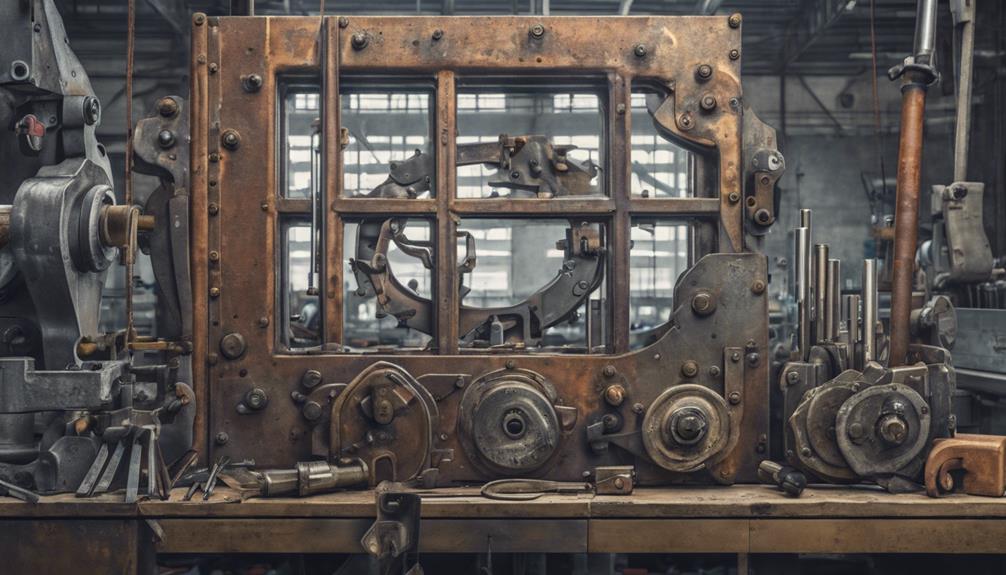Lock replacement in industrial properties is essential for securing your high-value assets. Outdated locks can be easily compromised, increasing the risk of theft. Upgrading to high-security locks or advanced systems like biometric and electronic access controls guarantees robust protection. Regular assessments help identify vulnerabilities in your current systems, while professional installation guarantees effective operation. Using durable locks also saves on maintenance costs over time. You'll not only enhance security but may also reduce insurance premiums. Keep exploring to discover the best practices for lock replacement and asset protection tailored for your industrial property.
Key Takeaways
- Regular lock replacement enhances security for high-value assets against theft and vandalism in industrial properties.
- High-security locks and advanced technologies provide robust protection and mitigate vulnerabilities in outdated locking systems.
- Conducting regular security assessments identifies potential risks and informs appropriate lock technology choices for better asset protection.
- Professional installation ensures effective lock operation and minimizes vulnerabilities associated with improper setup.
- Implementing smart locks allows for real-time access management and improved monitoring of facility security.
Importance of Lock Replacement
Security is paramount for any industrial property, and lock replacement plays an essential role in maintaining that security. You know that safeguarding your facility isn't just about physical barriers; it's about ensuring that the right locks are in place to protect your high-value assets.
Regular industrial lock replacement allows you to stay ahead of potential vulnerabilities, especially in a constantly evolving security landscape. Implementing essential lock replacement for business security is vital to mitigate risks associated with theft and vandalism.
When you choose to replace outdated or compromised locks, you're investing in industrial security locks specifically designed to withstand tampering and unauthorized access. These locks provide an additional layer of defense, making it harder for intruders to breach your property.
Plus, with the latest advancements in lock technology, you can enhance your overall security strategy and gain peace of mind.
Types of Locks for Industrial Use
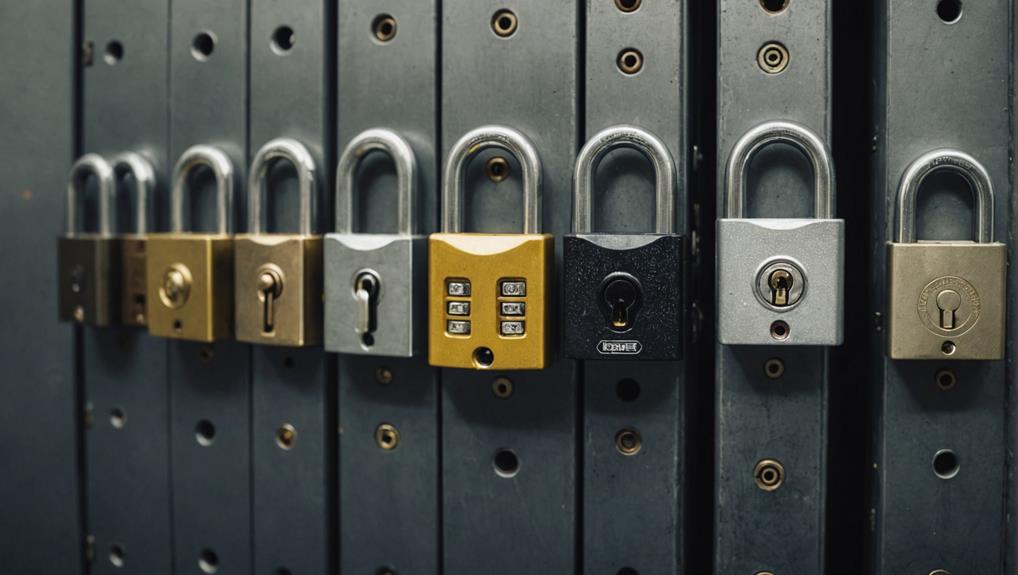
When it comes to securing your industrial property, choosing the right type of lock is essential. High-security locks offer advanced features, such as pick resistance and drill resistance, which greatly enhance the security of your assets.
You've got options like heavy-duty padlocks for robust security, electronic access control systems for convenience, and biometric locking mechanisms for advanced protection.
These advantages of high-security locks guarantee that your valuable items remain safe from unauthorized access.
Let's explore each of these types and see which one fits your needs best.
Padlocks for Heavy Duty
Padlocks designed for heavy-duty industrial use provide robust protection for valuable assets and facilities. When you're looking to secure your operations, you want the best locks for factories that can withstand the elements and deter unauthorized access. Heavy-duty padlocks are built from durable materials like hardened steel, making them difficult to cut or break, which is essential for safeguarding high-value items.
Choosing the right padlock can greatly enhance your security. Look for features such as shrouded shackles, which protect the locking mechanism from tampering, and weather-resistant coatings that guarantee longevity in various environments. By investing in these padlocks for heavy duty, you're making a proactive choice for your business's safety.
Don't hesitate to consult with industrial locksmith services for expert advice on selecting and installing the best locks for your specific needs. They can guide you to the most effective solutions available, assuring that your assets remain secure.
Electronic Access Control Systems
For industrial properties looking to enhance security beyond traditional locks, electronic access control systems offer a modern solution. These systems allow you to manage access with convenience and precision, making them ideal for securing industrial properties.
Unlike standard locks, electronic access systems provide customizable access levels, ensuring only authorized personnel can enter specific areas. You can choose from various types, including keycard systems, keypad entry, and mobile access solutions.
Keycard systems are particularly popular for lock replacement for warehouses, as they streamline entry while maintaining tight security. With these systems, you can easily deactivate lost cards or update access permissions in real-time, which is essential for maintaining a secure environment.
Moreover, integrating electronic access with surveillance systems can enhance the overall security of your industrial space. This combination helps you monitor who enters and exits, providing valuable data for safety protocols.
Biometric Locking Mechanisms
How can biometric locking mechanisms transform security for industrial properties? These innovative locks use unique biological traits—like fingerprints, retina scans, or facial recognition—to guarantee that only authorized personnel gain access. By implementing this technology, you can considerably enhance security, reducing the risk of unauthorized entry and potential theft of high-value assets.
Biometric locks offer several advantages over traditional locking systems. They eliminate the need for keys or access cards, which can be lost or stolen. Instead, you're relying on something that's inherently yours—your biological identity. This not only streamlines access but also fosters a culture of accountability among your staff.
Moreover, biometric systems can integrate seamlessly with existing security protocols, allowing for real-time tracking of who accesses certain areas. This feature can be invaluable in monitoring employee activity and guaranteeing compliance with safety regulations.
As you consider lock replacement for your industrial property, think about how biometric locking mechanisms can't only secure your assets but also empower your team. By prioritizing safety and efficiency, you're making a commitment to protect both your property and your people.
Assessing Security Needs
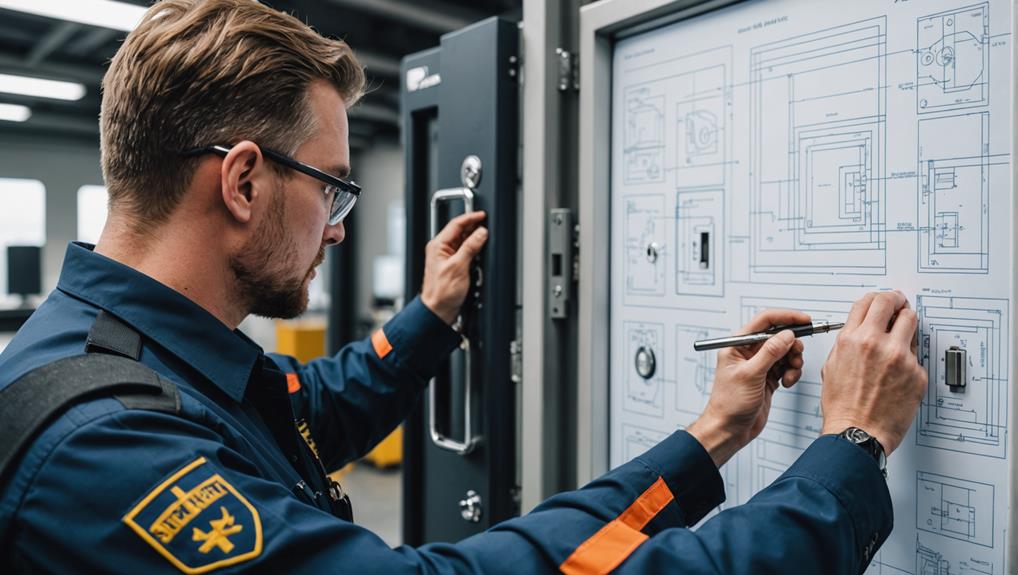
When evaluating security needs for industrial properties, it's crucial to take into account various factors that could impact safety and access control. Effective security measures, such as navigating re-keying challenges, can greatly enhance the safety of commercial properties.
By understanding these factors, you can create a tailored security strategy that serves both your assets and personnel effectively.
Here are three key considerations to help you assess your security needs:
- Property Layout: Analyze the layout of your facility. Identify potential vulnerabilities, such as entry points and blind spots. This will help you determine where additional security measures may be necessary.
- Employee Access: Consider who needs access to specific areas. Implementing a system that restricts access based on roles can minimize risks and enhance overall security.
- High-Traffic Areas: Focus on areas with frequent foot traffic, like loading docks or reception. These zones may require more stringent security measures, such as surveillance cameras or reinforced locks.
High-Value Asset Protection
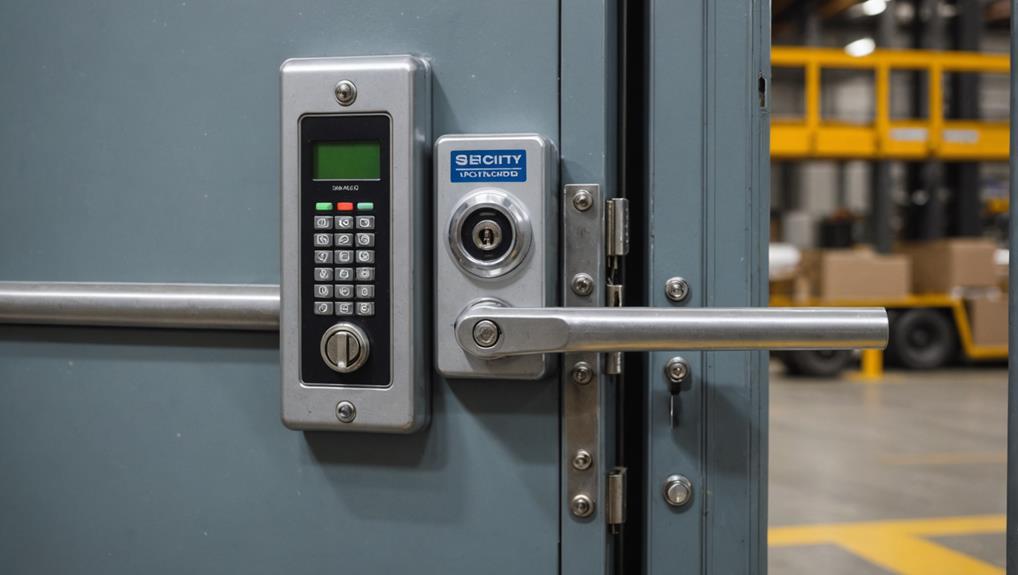
When it comes to protecting high-value assets, robust locks are essential for your industrial property.
Upgrading your locks is a critical step in enhancing security, and it's vital to evaluate informed choices when selecting lock technologies.
You should conduct regular security assessments to identify potential vulnerabilities and guarantee your defenses are up to date.
Exploring advanced lock technologies can provide you with the peace of mind that your investments are secure.
Importance of Robust Locks
Recognizing the value of your industrial assets is essential for effective security management. You can't afford to overlook the importance of robust locks. High-quality locks are your first line of defense against theft and vandalism, ensuring that your investments remain safe.
Here are three key reasons why you should prioritize strong locking mechanisms:
- Deterrence: A robust lock acts as a deterrent to would-be intruders. When they see high-quality locks, they're less likely to attempt a break-in, which protects your property and peace of mind.
- Durability: Industrial environments can be harsh. Strong locks are designed to withstand wear and tear, making them more reliable over time. This means fewer maintenance costs and less frequent replacements.
- Insurance Benefits: Using robust locks can sometimes lower your insurance premiums. Insurers recognize the reduced risk associated with quality security measures, which can ultimately save you money.
Regular Security Assessments
Conducting regular security evaluations is essential for protecting high-value assets in industrial properties. These analyses help you identify vulnerabilities in your current security measures, guaranteeing you're always one step ahead of potential threats. By regularly evaluating your security protocols, you can ascertain they align with your business goals and the specific risks associated with your assets.
During these evaluations, you should examine your locks, surveillance systems, and access points. Look for signs of wear and tear, and appraise whether your current systems meet the demands of your environment. Involving your team in this process can lead to valuable insights and foster a security-conscious culture within your organization.
Don't forget to take into account the surrounding environment as well. Are there potential blind spots or areas where intruders could gain easy access? By addressing these concerns proactively, you not only protect your high-value assets but also demonstrate a commitment to your team's safety and well-being.
Establish a regular schedule for these evaluations, and make it a priority. This proactive approach shows your dedication to safeguarding what matters most, ultimately benefiting everyone involved.
Advanced Lock Technologies
As the landscape of security threats evolves, incorporating advanced lock technologies becomes essential for safeguarding high-value assets in industrial properties.
These technologies not only enhance security but also provide peace of mind for you and your team, allowing you to focus on serving your clients effectively.
Here are three advanced lock technologies to evaluate:
- Smart Locks: These locks use Bluetooth, Wi-Fi, or biometrics for access control, enabling you to grant or revoke access remotely. You can track who enters and exits, adding an extra layer of security.
- Keyless Entry Systems: Replace traditional keys with key fobs or mobile access. This eliminates the risk of lost keys and allows you to manage access easily, ensuring only authorized personnel can enter sensitive areas.
- High-Security Cylinder Locks: Designed to resist picking, drilling, and bumping, these locks provide robust physical security. They often come with restricted keyways, minimizing the risk of unauthorized duplication.
Investing in these technologies not only protects your assets but also demonstrates your commitment to safety and professionalism in your operations.
Common Vulnerabilities in Industrial Properties
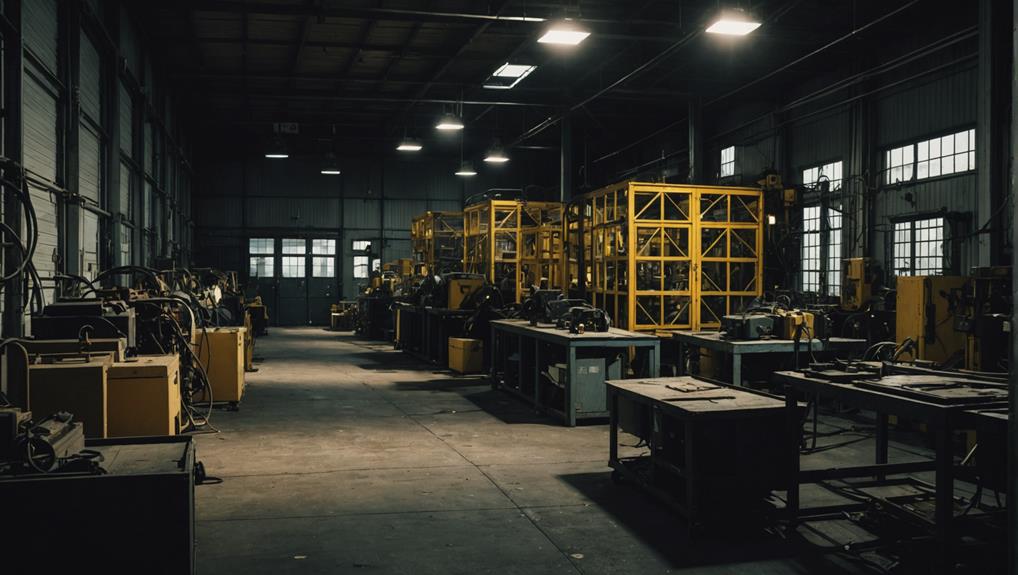
When it comes to industrial properties, overlooking common vulnerabilities can lead to significant security risks. You might think that your facility's size and complexity inherently offer protection, but that's often not the case. For instance, outdated locking mechanisms can be easily compromised, allowing unauthorized access to valuable assets.
Additionally, implementing enhanced security measures through re-keying can provide an extra layer of protection in shared access areas.
Furthermore, weak points such as loading docks and service entrances are often neglected. These areas may lack adequate security measures, making them prime targets for intruders. If you haven't assessed the effectiveness of your perimeter security, you might be leaving gaps that could be exploited.
Another common issue involves inadequate staff training on security protocols. Employees who aren't aware of potential threats may inadvertently contribute to vulnerabilities.
Regular training can empower your team to recognize and address security risks effectively.
Choosing the Right Lock System
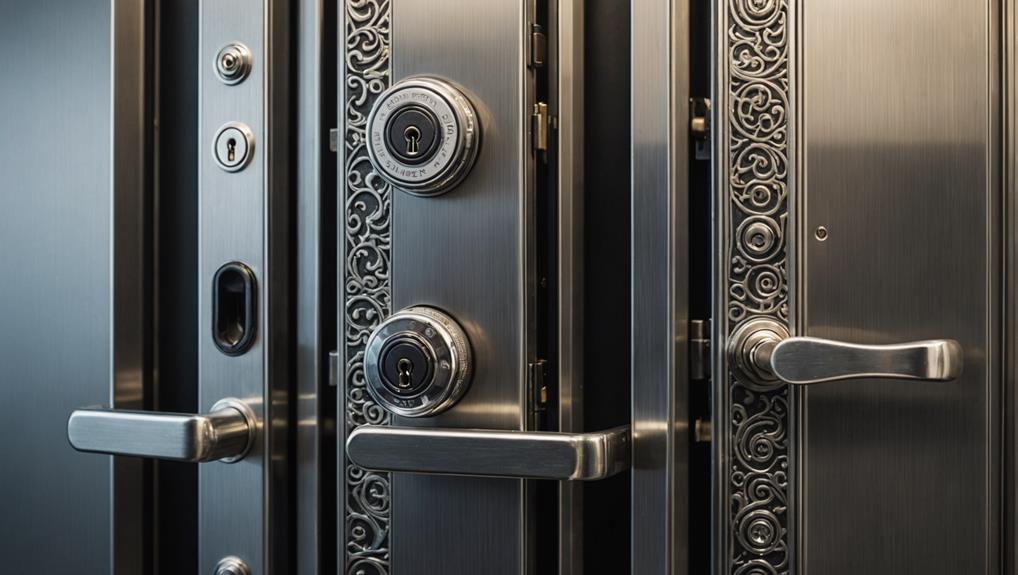
Selecting the right lock system is essential for addressing the vulnerabilities identified in industrial properties.
It's important to take into account not only the security needs but also how local building codes may influence your lock replacement decisions. You want to guarantee that your high-value assets are well-protected, which means making informed choices about the lock systems you implement.
Here are three key factors to take into account:
- Security Features: Look for locks with advanced security features like anti-picking and anti-drilling capabilities. These can greatly enhance your property's defense against potential intruders.
- Durability: Industrial environments can be tough on equipment. Choose locks made from robust materials that can withstand harsh conditions, like moisture and extreme temperatures, guaranteeing they function reliably over time.
- Access Control: Think about a lock system that allows for customizable access control. This can help you manage who enters your property, providing temporary access for contractors while keeping unauthorized individuals out.
Professional Installation Services
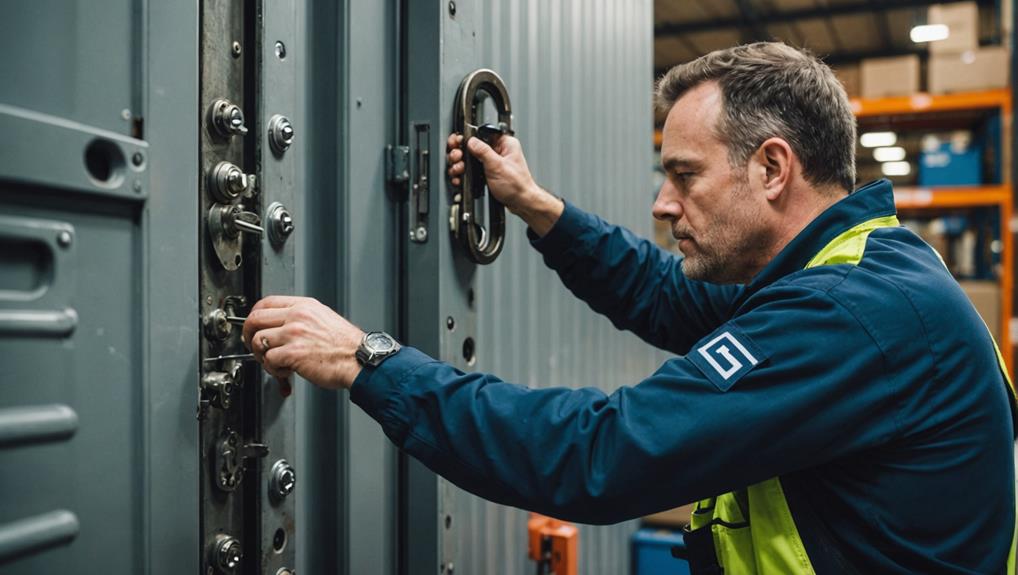
Professional installation services play an essential role in ensuring that your new lock system operates effectively and securely. When you invest in high-quality locks for your industrial property, you want to be confident that they provide the protection you need.
Professional installers have the expertise to assess your specific requirements, ensuring that the lock system is tailored to your environment. They can also assist with comprehensive evaluations for lock replacements to determine the best options for your property.
By choosing skilled professionals, you eliminate the risk of improper installation, which could leave your property vulnerable. They'll handle everything from precise measurements to proper alignment, ensuring that each lock functions smoothly.
Additionally, they understand the latest security technologies, which means they can integrate advanced features that enhance safety.
Beyond just installation, these experts can offer valuable insights into the best practices for using your lock system. They'll make sure you fully grasp how to operate and manage the locks, empowering you to maintain a secure environment for your assets.
In short, hiring professional installation services not only secures your property but also demonstrates your commitment to protecting your valuable assets. It's an investment in peace of mind that pays off in the long run.
Regular Maintenance and Upgrades
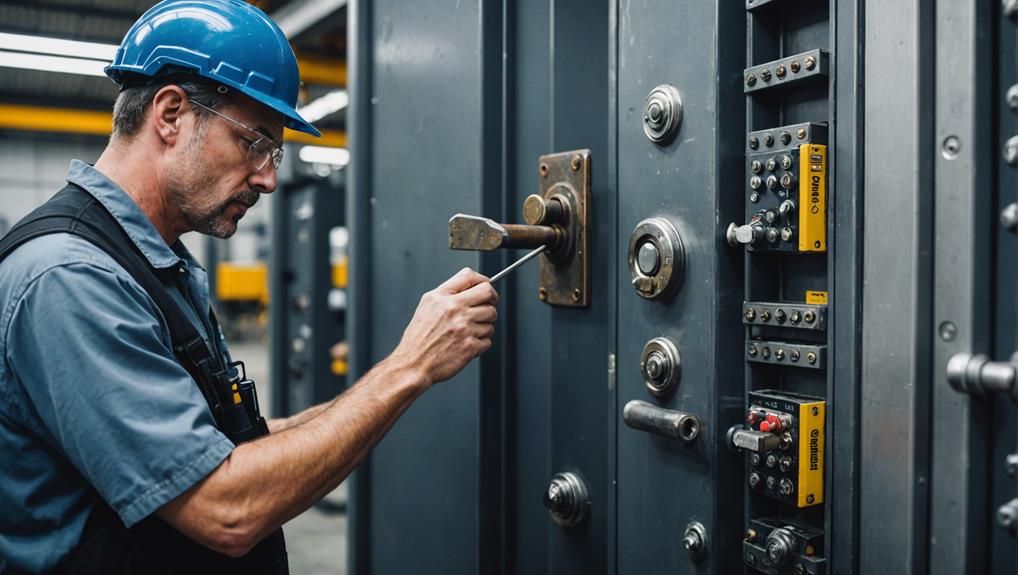
Maintaining and upgrading your lock system is essential for guaranteeing ongoing security in your industrial property.
Regular attention to your locks not only protects your high-value assets but also demonstrates your commitment to safety for your employees and clients.
According to experts, investing in high-quality lock systems and understanding various lock replacement options can considerably enhance your security measures.
To keep your lock system in top shape, consider these three key practices:
- Routine Inspections: Check your locks periodically for any signs of wear or damage. Address issues immediately to prevent security breaches.
- Lubrication: Apply a suitable lubricant to your locks at least once a year. This helps to prevent rust and guarantees smooth operation, reducing the risk of lock failure.
- Upgrade to Smart Technology: Consider integrating smart locks that offer advanced security features. These can provide real-time monitoring and easier access management, enhancing your overall security strategy.
Emergency Lock Replacement Procedures
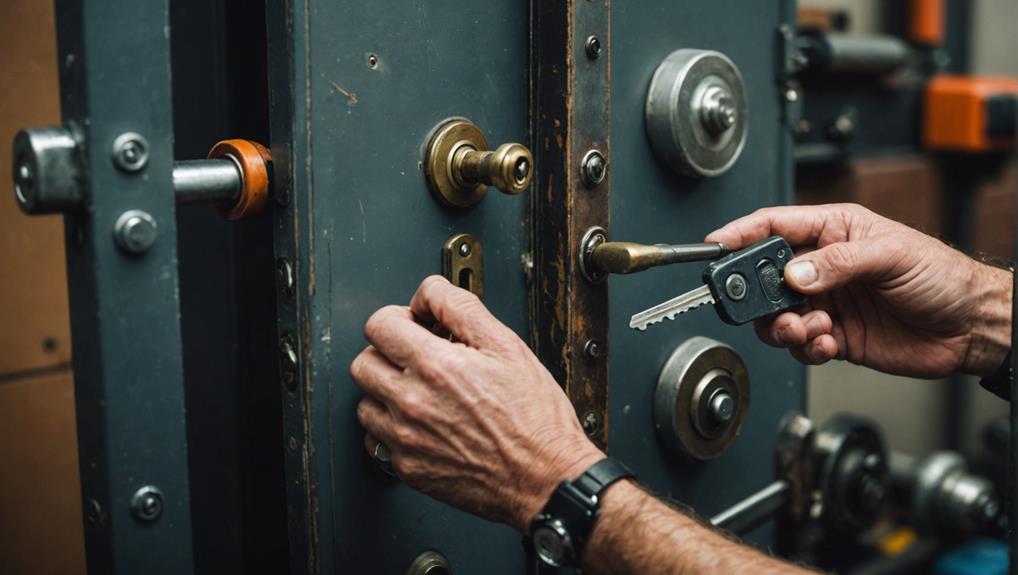
Even with regular maintenance and upgrades, emergencies can happen that require immediate lock replacement. When you find yourself in such a situation, the first step is to assess the urgency. If a lock is malfunctioning or has been compromised, you'll want to act quickly to guarantee safety and security, as the costs involved in emergency replacements can vary considerably depending on the circumstances and urgency of the situation emergency lock replacement costs.
Start by contacting a reliable locksmith who specializes in commercial properties. They'll be equipped to handle emergency situations efficiently. Provide them with specific details about the lock type and the nature of the emergency. This helps them prepare the necessary tools and replacement parts.
While waiting for the locksmith, secure the area as much as possible. If you can, use temporary measures like additional security personnel or barriers to prevent unauthorized access.
Once the locksmith arrives, communicate openly about your needs and concerns. They'll guide you through the replacement process, guaranteeing you're informed every step of the way.
After the replacement, consider discussing preventive measures with the locksmith. This can help you avoid future emergencies and keep your industrial property secure, ultimately serving your clients and stakeholders better.
Frequently Asked Questions
What Are the Signs That Locks Need Replacement?
You'll notice several signs that your locks need replacement. If they're hard to turn or stick when you try to use them, that's a red flag.
Look for visible damage, like rust or cracks, which can compromise security. If keys start to bend or break, it's time to contemplate new locks.
How Often Should Lock Systems Be Updated?
Think about it: when's the last time you updated your locks?
Ideally, you should refresh your lock systems every three to five years. This guarantees they stay effective against evolving security threats.
Regular updates also give you peace of mind, knowing you're protecting not just your property but also the people who rely on it.
Can Old Locks Be Rekeyed Instead of Replaced?
Yes, old locks can often be rekeyed instead of replaced.
It's a cost-effective solution if the lock is still in good condition. When you rekey, you change the internal mechanisms to work with a new key, which enhances security without the expense of a full replacement.
Just remember, if the lock shows signs of wear or damage, it might be better to replace it for reliable protection.
What Is the Average Cost of Lock Replacement for Industrial Properties?
The average cost of lock replacement can vary based on several factors, including the type of lock and the complexity of the installation.
Generally, you're looking at anywhere from $50 to $200 per lock.
If you're replacing multiple locks or opting for high-security options, the total can increase markedly.
It's wise to get quotes from local locksmiths to guarantee you're getting the best service and value for your investment.
Are Smart Locks Suitable for Industrial Environments?
When it comes to smart locks in industrial environments, you've got to weigh the pros and cons.
They offer convenience and remote access, but reliability is key in high-stakes settings.
If you're considering a smart lock, make certain it meets your security needs and can withstand harsh conditions.
It's crucial to find a balance between innovation and durability, so you don't throw caution to the wind when securing your valuable assets.
Conclusion
In securing your industrial property, don't underestimate the importance of lock replacement. Did you know that 40% of break-ins happen due to weak locks? By choosing the right lock system and prioritizing regular maintenance, you can greatly reduce the risk of theft and protect your high-value assets. Investing in professional installation and staying proactive about upgrades guarantees your security measures remain effective. Remember, safeguarding your property starts with a strong lock—don't wait until it's too late!

